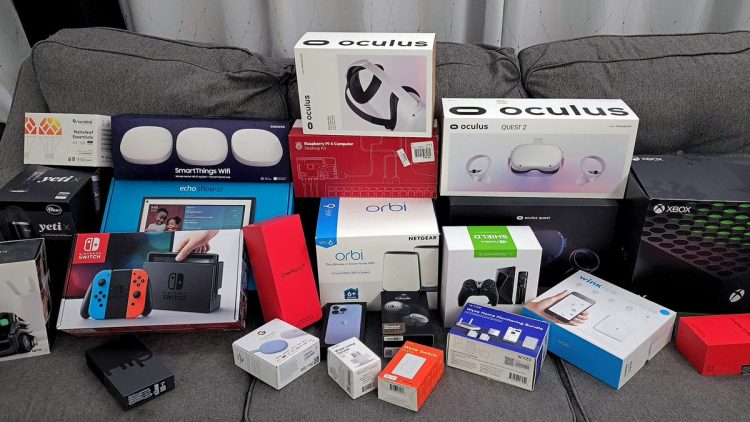Josh Hendrickson / Review Geek
Dealing with Amazon boxes is hard enough. But the phone, computer, or video doorbell you ordered comes with its own unique packaging that can turn into a permanent hump on your back. Should you let these old boxes eat up space in your closet, or do they belong in the trash?
Keep Boxes for Returns, at the Very Least
When you buy an expensive new device, try keeping the packaging for at least a few weeks. Most retailers, including Amazon, are supposed to decline any returns that aren’t in their original box. And in some cases, a retailer will take a cut of your return if you don’t have the packaging.
Now, maybe you’ve had a different experience with returns. Companies often make exceptions to their return policy for the sake of customer satisfaction. This is especially true when a product is defective.
But nobody wants to have a difficult time returning an item. Keeping a box for a few weeks just makes things easier. Plus, it’ll save you from spending a bunch of money on a new box, packing peanuts, or bubble wrap.
When you know that a product doesn’t need to be returned, you can break down the packaging and split it into trash and recycling. But maybe you should keep the box for a little longer; it’s hard to say.
Original Packaging Also Increases Resale Value
You’re going to upgrade your phone or tablet at some point. And if you keep the original packaging for these devices, you can net an extra $15 or $20 in resale value. This is true for nearly all electronics, and it’s the biggest argument in favor of keeping old boxes.
Selling a product with its original packaging gives the illusion that you’re a good caretaker. Plus, if you leave any of a product’s accessories or instructions in the box, you may have a genuine reason to charge more money—someone might really want that extra stuff!
Plus, some boxes have the potential to become “collector’s items.” People love old Apple and Nintendo boxes, even when the boxes are just for small accessories. And for whatever reason, some musicians are obsessed with the packaging for old guitar pedals and keyboards.
Now, an old box won’t always increase a product’s resale value. Most people won’t pay extra for your five-year-old TV’s packaging, nor will they shell out for a cheap wireless charger’s box. And if you expect to push a to its death (like a security camera that’s in a harsh environment), you probably shouldn’t worry about resale value.
But will you actually resell your old electronics? If you’re hoarding a bunch of boxes but rarely sell your stuff, maybe it’s time to clean out your closet. Clinging to the idea of “this might be worth something” is a dangerous game!
Old Boxes Make Moving and Maintenance Easier
 Josh Hendrickson / Review Geek
Josh Hendrickson / Review Geek
In some cases, keeping an old box just makes your life easier. Maybe your video doorbell came with extra mounting equipment, or your Xbox’s packaging has some nice foam padding. In these situations, keeping the box can be a convenience.
I’ve found that this is especially true when moving. A new home may require the small hardware that you left in a smart thermostat’s box. And hey, you don’t need to worry about your Xbox getting damaged during a move if you still have the styrofoam-filled packaging.
Admittedly, this isn’t the best argument for keeping old boxes. Some people stay in the same home for years or decades, and keeping old boxes just in case may be a waste of time or space. You can always organize instruction manuals and spare parts in plastic baggies, and realistically, electronics are rarely the first thing to break during a move.
Some Boxes Just Aren’t Worth Keeping
 Yeah, you don’t need to keep this box. VIZIO
Yeah, you don’t need to keep this box. VIZIO
Most electronics boxes contain styrofoam, hard plastic, or other parts that can’t be flattened. So, they take up a lot of space. It’s not a big deal when a box is tiny, but it’s a pain in the neck when you have a great big box for a desktop monitor, a sound system, or some other massive product.
You can usually throw away these big boxes without any regret. People rarely resell their large electronics, and when they do, it’s usually a local affair. Shipping a 40-inch TV to someone on eBay isn’t an enjoyable experience, and while the box might make shipping easier, it’ll probably just end up in the buyer’s trash.
There are some exceptions to this rule. You should probably keep new boxes for a few weeks in case a product needs to be returned. If you’re moving to a new home soon, a TV’s box can come in handy. And hey, maybe you plan to upgrade your big digital piano in a few years—the box could add to its resale value and make shipping easier.
And again, some large electronics could become collectibles. Their box may be valuable someday. But this is rarely the case for the average computer, TV, desktop monitor, soundbar, or other massive hunks of equipment.
How to Store Your Old Boxes
 It’s a messy garage, but plastic containers keep boxes dry! trekandshoot / Shutterstock.com
It’s a messy garage, but plastic containers keep boxes dry! trekandshoot / Shutterstock.com
Storing old boxes is a genuine nightmare. You have just a few options—shove them in a closet, cram them in the garage, dump them in a storage unit, or stack them on the floor. And if you’re a dork, I guess you can use old boxes as decorations.
The problem, of course, is that you can’t flatten electronics packaging. It usually contains a bunch of extra plastic, spare parts, or other nonsense.
My advice is to try and avoid a hoarder mindset. You can probably think of a dozen reasons to keep an old box, but you only have so much space. Throw away the boxes that don’t matter. And find a clean space to store and organize the boxes that are genuinely worth keeping. (If you’re storing old boxes in a garage, put them in a plastic container to keep water or bugs out.)
Here’s a fun suggestion; use your old boxes as storage. You’d be surprised by how many cables or Christmas ornaments an Xbox’s packaging can hold. If you label these old boxes with painter’s tape, you shouldn’t have much trouble finding anything you squirreled away.
Source by www.reviewgeek.com





























